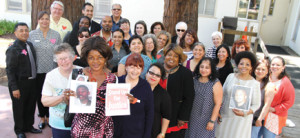 Participants in the San Francisco Archdiocese Restorative Justice Ministry's homicide survivors assistance and support retreat (Photo by Christina Gray/Catholic San Francisco)
Participants in the San Francisco Archdiocese Restorative Justice Ministry's homicide survivors assistance and support retreat (Photo by Christina Gray/Catholic San Francisco)
The Catholic Archdiocese of San Francisco Restorative Justice Ministry recently hosted a retreat for nearly 40 survivors of homicide and representatives of organizations that support them. The retreat included Restorative Responses to Adversity and Trauma, a professional development event conducted by the International Institute for Restorative Practices. The event gave participants a deeper understanding of their own trauma and loss as well as skills to help themselves and others cope with similar experiences.
“The most amazing thing was getting people to the leadership moment, where they can actually begin to see their healing on a higher and deeper level, as well as some restoration as a step in their healing process,” affirms Julio Escobar, director of the Restorative Justice Ministry. “We wanted to introduce the concept of restorative justice and restorative practices from an accredited organization like the IIRP,” he explains.
One attendee at the retreat, Roberta Fitzpatrick, whose 14-year-old grandniece was brutally murdered by her father eight years ago, says she found it “reassuring and helpful. Because of all the people that were there [also relatives of murder victims], you know you’re not alone, and you know that you’re not crazy. Most people say, ‘Forgive, forgive, forgive,’ but they have no idea. I can’t forgive what he did.”
Fitzpatrick came to the retreat not only for her own benefit. She explains, “I have met many other victims who have survived or are trying to survive. I wanted to be able to be more helpful to them.”
One aspect of the IIRP event involved familiarizing participants with restorative conferences, which bring together offenders, victims and their respective families and communities of support, to communicate with each other, begin the process of restoring relationships and discover their common humanity.
Fitzpatrick says she took away a deeper insight about what restorative justice really is. “People always talk about restorative justice and say, ‘Did you ever think about sitting down and talking it over with him? I learned that if that is ever possible, it takes a whole lot of preparatory work. A person has to be at a point where they can handle that without being totally destroyed.”
The workshop also provided guidance on the use of the Restorative Questions, including “What happened?” and “What impact has this incident had on you and others?”
Fitzpatrick finds the questions valuable in her monthly support group, Parents of Murdered Children. “When a new person comes into our group the questions make you feel more confident about how to approach them and help them to speak if they want to.” (She is able to refer to these questions, using a small card given to all event participants to take home.)
IIRP Lecturer Elizabeth Smull, who facilitated the event, observes, “What struck me the most was the participants’ passion for what they did, no matter what constituencies they worked with: victims, offenders or their communities of care. This opportunity not only allowed them to see how they could help others move through trauma and grief, but also to reflect on themselves and explore some self-care: how to keep themselves healthy and supported so they can continue to do this work.”
Smull notes that during the workshop, participants learned and practiced “compassionate witnessing,” a process for staying present and really listening to what people are experiencing. “It was all so relevant to their communities,” declares Smull. “I think they saw ways to be able to have conversations and not be afraid.” Compassionate witnessing, she explains, “helps you tease out people’s experience. At the same time, we talked about how you don’t have to fix it.”
Margaret Petros, Executive Director of Mothers Against Murder, an advocate for victims of crime for more than 25 years, found the information she gained at the event “refreshing,” adding, “How to listen to the victim’s family with compassion, how to question them, was very helpful.”
Petros contends that such an approach is needed because victims of crime, especially homicide, often find that the judicial system is indifferent to their needs and difficult to maneuver. In Fitzpatrick’s case, for example, eight years after the murder of her niece, she is still waiting for a trial date, despite having attended court more than 70 times on behalf of her family for various hearings.
Petros often sees families of murder victims suffering in silence. “Most of the murder victims’ moms I work with want to go away into hiding. We wonder, ‘Why aren’t they out there advocating to change the system, which isn’t treating them fairly?’”
At the retreat, however, she was happy to see so many mothers of victims in attendance. “I was really impressed with the work the archdiocese is doing and the number of homicide victims’ moms that were there. Obviously they are there because the archdiocese is attending to them, listening to their stories. They clearly enjoyed being there and keep coming back. They have the strength to go on, to work together, give their opinions. Bravo to the archdiocese. I hope to see more of this around the country.”
Escobar is sure to emphasize that the Restorative Justice Ministry is not only for Catholics, but open to all members of the community affected by violence. It offers support for navigating the penal system, home visits and healing circles for victims’ families and friends. To address issues facing offenders, the ministry recently organized a reentry conference attended by over 200 people, including the formerly incarcerated, their families and various service providers. “We accompany families in their pain and their healing process, whether they’re in jail or they just came from a cemetery,” explains Escobar, concluding, “The church, we’re an integral part of this world; we cannot detach. We’re connecting with people in a transparent way.”
